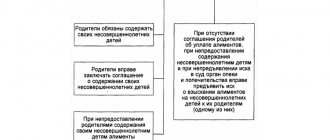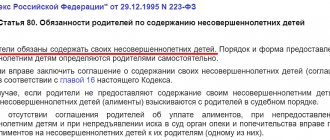Author of the article: Elena Petrenko Last modified: January 2020 6208
Collection of alimony is possible both during marriage and after its dissolution. Often, at first, women do not claim money from the fathers of their children, but then still file claims in court. If your ex-wife has filed for alimony, you will most likely have to pay, but there are a number of exceptional cases in which the amount of payments may be reduced or the court decision may be cancelled.
Important to know: alimony payments begin to accrue from the moment the claim is filed.
According to Article 107 of the Family Code, the start date for calculating alimony is the date the court receives the statement of claim. This means that no matter how long the trial itself takes, if the court makes a positive decision for the recipient of alimony, the money will be collected from the payer starting from that date.
Moreover, according to the same article, if the recipient of alimony manages to prove in court the fact that he tried to collect child support before filing documents with the court, then alimony can be calculated for the past period, but not more than for three years preceding moment of submission.
When alimony is not awarded
Yes. As already mentioned, the current restrictions apply to both men and women. That is, spouses in an official marriage have the same rights. But in practice, it is women who are given more freedom. This is a normal experience in modern Russia.
Alimony for maintaining a wife during marriage (and after it) is not paid if:
- the spouse's incapacity for work occurred as a result of her behavior;
- for a short marriage (up to 1 year inclusive);
- the potential recipient of alimony behaved inappropriately (violated legal and moral standards of behavior, committed a crime against the alimony payer).
The topic being studied does not have any other features. Issues related to alimony are almost always resolved in court. It is almost impossible to reach a peaceful agreement. Especially if the wife filed for alimony without a divorce.
How long does the legal process last after filing a claim?
When considering a case in ordinary lawsuit proceedings, the trial lasts one month. During this period, the judge must schedule and conduct the trial, as well as make and announce his decision to the parties. According to Article 211 of the Code of Civil Procedure of the Russian Federation, such a decision must be executed immediately.
Thus, from the day the court receives the documents until the moment the writ of execution is received, only one month will pass. But, this is provided that the claim is filed in accordance with Russian legislation.
If documents are submitted in violation of the rules of the Code of Civil Procedure of the Russian Federation, the court may refuse to accept them to the plaintiff, return the documents to him, or leave the case without progress until all the shortcomings of the submitted documents are eliminated. Such measures will lead to an increase in the time frame for receiving the writ of execution.
Amount and procedure of payments
The legal process is based on Resolution of the Plenum of the Supreme Court of the Russian Federation dated December 26, 2017 No. 56 “On the application of legislation by courts when considering cases related to the collection of alimony.”
“The Family Code of the Russian Federation provides a list of persons who have the right to demand alimony from a former spouse who has the necessary means for this.
This right is exercised in court” Denis Frolov, partner of the law firm BMS Law Firm
Photo: The court determines the procedure and determines the amount of financial assistance. Source: freepik.com/freeograph
Payments to the wife are not a clearly defined mandatory payment. Alimony is provided in hard cash for a child under 3 years of age. In this case, the court also takes into account the husband’s financial capabilities.
From the editor! If the defendant himself does not have enough funds to satisfy basic needs, the demands may be refused (clause 43 of resolution No. 56).
Despite the fact that during the debate it is the woman who appears as the weaker party, the court takes seriously the position and rights of the male defendant, dividing equal legal parity between the parties.
“The court will assess the mother’s need for financial support, take into account life circumstances of a material and family nature (for example, extremely small “children’s” benefits, lack of other sources of income, the need for expensive treatment or rehabilitation, the presence of several children).
Having established the mother’s real need for material support, as well as the father’s financial capabilities, the court will oblige the father to make monthly payments in a fixed amount, the amount of which will be correlated with the cost of living in the region.” Semyon Frolov, lawyer
The letter of the law presupposes a voluntary agreement on the procedure for the implementation of monetary assistance or maintenance.
From the editor! Oral agreements are permitted, but do not provide any guarantees for their implementation. In this case, it is impossible to collect debts through the court. To acquire legal force, an agreement is concluded in writing and certified by a notary.
Example. Vasily Ignatievich and Svetlana Viktorovna have been married for almost 35 years. The husband took care of the business, and the wife spent the last 15 years taking care of the house and raising their grandchildren. When her husband left for another woman and filed for divorce, Svetlana did not give up. She also agreed with the division of property - according to the marriage contract, she got a dacha. But when she started looking for work, she realized that she was in a difficult situation. There are still 4 years left until retirement, experience is lost, all interviews end in refusal.
The ex-husband refused any conversations, so the woman went to court. Before the start of the trial, Vasily Ignatievich suggested that she resolve the issue peacefully, since he did not want publicity. He agreed to pay lifelong maintenance to his ex-wife in the amount of 25,000 rubles. monthly. But after 3 months I stopped transferring money. The woman could not contact the bailiffs, since the agreements were oral. Svetlana filed a second claim. The court ordered alimony of 12,000 rubles. If the agreement had been immediately notarized, the woman would receive assistance in full, which was initially guaranteed by her husband.
Photo: freepik.com/ksandrphoto
Time frame for consideration of the case after filing an application for alimony
In cases established by the Code of Civil Procedure, citizens have the right to have their case considered in simplified (mandatory) proceedings. In writ proceedings, the judge independently makes a decision, without holding a court hearing. The parties to the case are not invited by the judge and are not heard.
When making a decision, the judge is guided only by the arguments of the claimant, set out by him in the application. The judge's decision is formalized in the form of a court order, which must be issued no later than 5 days from the date the court receives the corresponding application from the claimant.
After the court issues an order, a copy of this document is sent to the alimony payer (debtor). The debtor has the right to express his objection to it within ten days. The objection must be made in writing to the magistrate who made the order.
If the alimony payer sends an objection to the court, the order will be canceled, regardless of what arguments were given by the debtor in this document. In this case, the claimant has the right to prepare and file a statement of claim with further consideration of the case in court in general (claim) proceedings.
Results
- The period for consideration of a case on the collection of funds from a minor or other dependent depends on the judicial procedure in which they are collected.
- The position of the defendant (debtor) in the case is also important. If he does not object to the collection, then the case can be considered extremely quickly. If there are any objections, then you can expect anything: a demand to cancel the court order, a counterclaim filed in court.
- The general period for consideration of a child support dispute is up to 1 month. Shortened – up to 5 days. They may well add up if, after the application for extradition, an order must also be filed.
On how best to proceed in a particular situation: try to do everything quickly, or reach the goal slowly but surely - it is better to consult with a competent and qualified lawyer who has been collecting alimony payments for several years. At first glance, it may seem that it is better to solve everything in 5 days, but if, for example, the defendant is in a combative mood, then everything will drag on for more than 1 month. Here, tactics of action based on legal norms and analysis of a specific situation are very important.
Refusal to accept the application, return of the application to the claimant
The judge has the right to refuse to accept the claimant in the following cases:
- Previously, an order was issued on the application of the same claimant, to the same debtor, on the same grounds, with the same requirements;
- The case is not subject to consideration by order;
- The alimony payer lives outside the Russian Federation;
- The documents provided reveal a legal dispute.
The return of documents is carried out in the event of non-compliance with the requirements for the application form, as well as its content, or in the event of failure to provide documents confirming the stated requirement.
Deadlines for receipt of alimony after filing a writ of execution with the bailiffs
Sometimes, in order for the alimony payer to start paying alimony on his own, a court decision is enough. But, more often, in order for money to start flowing from the debtor, an appeal to the bailiffs is required.
In order for the bailiff to begin enforcement proceedings, the claimant must provide him with a writ of execution and a statement. Within three days from the date of receipt of these documents, the bailiff is obliged to issue a resolution to initiate enforcement proceedings or refuse to initiate them.
After the start of the proceedings, the bailiff sends requests to various authorities and organizations to determine the debtor’s place of work, his earnings, as well as the money and property he has. If the debtor works under an employment contract, then the bailiff sends documents to the organization in which he works to withhold and transfer money from the debtor’s salary to the recipient. The approximate time frame for the start of receiving money in such a situation is 2 months.
However, the debtor does not always have any income, money or property. In some cases, you may not even have to wait for funds to arrive.
Often, avoiding the need to pay child support, the payer goes into hiding and hides his property. In such situations, the bailiffs, on their own initiative or at the request of the claimant, may begin efforts to search for the debtor or his property. And if such a search is not successful within a year, the claimant acquires the right to have the debtor declared missing through the court.
What does the document look like?
A writ of execution is official documentation that includes important information:
- series and individual number;
- information about the court that issued the sheet;
- description of the resolution, which consists in the need to collect alimony from the defaulter;
- the amount of payment for each child;
- the date of the court decision, as well as the date it entered into legal force;
- passport details of the alimony payer;
- procedure for transferring funds.
Only if there is a correctly executed writ of execution is the forced collection of money for the financial support of minors.
The document is affixed with the seal of the court and the signature of the judge who made the decision in this case. The document is issued to the direct alimony collector, and can also be transferred to a representative of the FSSP if the plaintiff does not want to independently transfer the document to the defendant’s place of work.
Independently contacting the accounting department of the organization that is the debtor’s employer
The alimony claimant, who has received a writ of execution and has information about the official place of work of the debtor, can contact the organization’s accounting department independently, bypassing the SSP.
To do this, the recipient of alimony must submit an application and a copy of the writ of execution. The money will start coming in from your next salary. The deadline for transferring alimony is 3 days from the date of payment to the employee of wages or other payments, including bonuses, allowances, vacation pay, and so on.






